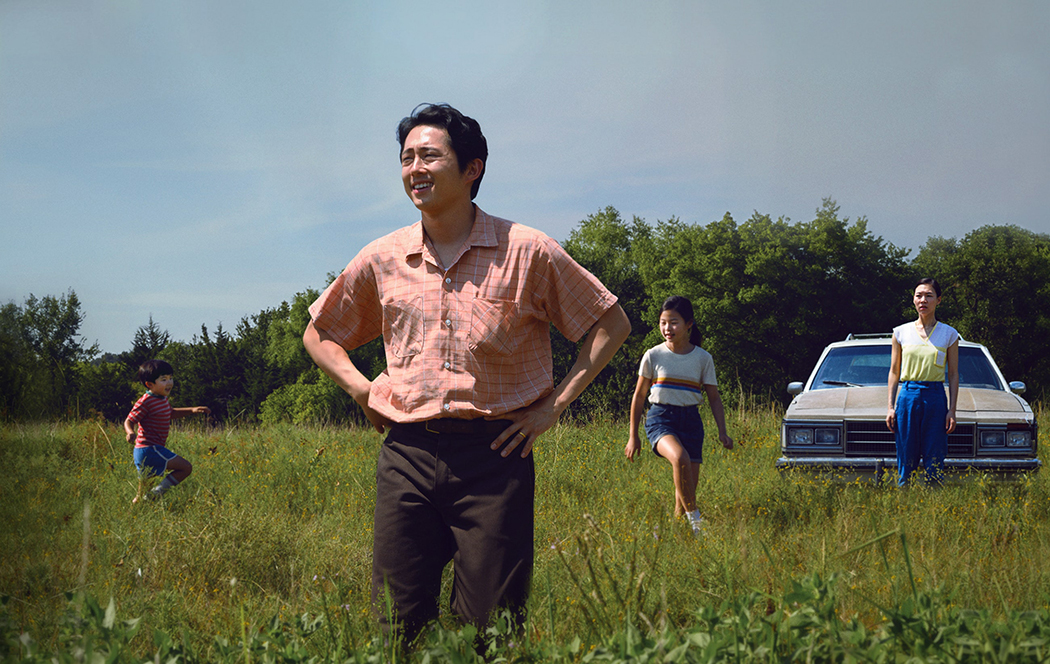Few things are as American as tales of immigrants pulling themselves up by their bootstraps and making a life through hard work and sacrifice. For better or worse, our national penchant for embracing this narrative is hard to deny. Initially, Minari may seem like one of those all-too-familiar sagas—but Lee Isaac Chung’s keen eye for moments and commitment to affection over nostalgia make the film more substantive than expected.
Minari is a semi-autobiographical look at writer/director Chung’s own childhood. Chung was raised on an Arkansas farm by Korean immigrants, and his film uses a vegetable farm in the Deep South as its jumping off point. But this is not your typical corn or wheat plot—patriarch Jacob (Steven Yeun) wants to grow Korean vegetables for his fellow transplants to satisfy both their palates and an untapped market. Not a bad idea, in theory.
Chung might be currently closer in age to his father figure in the film, but he is represented on screen by precocious newcomer Alan Kim as David, who is generally well behaved and keeps to himself when not with sister Anne (Noel Cho) or his mother, Monica (Yeri Han).
Grandma (Youn Yuh-jung) arrives a few months after the family has moved from California to Arkansas, presumably to help with the house and children. But instead of getting a strict and buttoned-up matriarch, we get Soonja, a youthful and lively presence. She insists on doing what she wants, when she wants, regardless of what Jacob or Monica might suggest.
Monica is happy enough, but she misses her life before living in a trailer on a farm. Jacob wants more—more money and more respect—and he wants to grow something of his own that he can be proud of. When Monica suggests starting their farm slowly and building it over time, he is offended that his new pursuit might be mistaken as a hobby. This is his profession.
The highs and lows of this family could have easily slipped into the saccharine and hellscape, but Minari has a more nuanced view of the past. When things get bad—and they do get bad—hope is not lost. Nor are these people phoenixes, triumphantly emerging from the flames. They are a loving family that needs to mourn and keep moving forward. It is this active resistance of the Hollywoodification of their experiences that keeps Minari firmly rooted in the ground Jacob sows.
This is not to say there are no lessons in Minari. Its even-keeled handling of the slightly fictionalized youth of the writer/director doesn’t prevent it from having a few heavy-handed, teachable moments. Most notably, the film is named after a robust vegetable that grandma insists on growing by a nearby brook. The frequent repetition that Minari can grow anywhere, and both the rich and poor eat it, does not distract from the value of the metaphor.
All of this drama and parable is artfully displayed, thanks to cinematographer Lachlan Milne. The lush—though occasionally barren—farmland begs for sweeping camera movement and a soaring score. Milne balances the grandeur of the pastoral with the intimacy of the people who shape that land. The camera sits with their faces, and shows their body language with a sharp attention to both style and substance. We not only hear what they say, but we rest with them and feel the love and the frustration, the kindness and the criticism.
Minari premiered at the Sundance Film Festival in 2020, and has been generating Oscar buzz since. Both Yeun and Yuh-jung have racked up plenty of critical praise and year-end awards, as has Chung for both his writing and his directing. This attention is well-deserved. Minari is sweet without being cloying, and allows its audience the time and space to get to know its characters. Such affection is welcome warmth during this cold winter.
